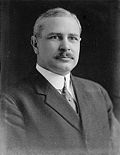| |||||||||||||||||||||
| |||||||||||||||||||||
 County results Fielder: 30–40% 40–50% 50–60% 60–70% Stokes: 30–40% 40–50% 50–60% 60–70% | |||||||||||||||||||||
| |||||||||||||||||||||
| Elections in New Jersey |
|---|
 |
The 1913 New Jersey gubernatorial election was held on November 4, 1913. Democratic acting Governor James Fairman Fielder, who resigned a week before the election so that he could succeed himself, defeated Republican former Governor Edward C. Stokes and Progressive former state senator Everett Colby.
Contents
- Democratic primary
- Candidates
- Candidates 2
- Results
- Republican primary
- Candidates 3
- Campaign
- Results 2
- Progressive primary
- Candidates 4
- Campaign 2
- Results 3
- General election
- Candidates 5
- Results 4
- References
The state's first-ever direct primary elections for governor were held on September 23, [1] though the contests were largely uneventful. For the Democratic nomination, Fielder defeated former Trenton mayor Frank S. Katzenbach, making his third run for governor. Stokes easily topped a four-man field in the Republican Party, including former U.S. Representative Charles N. Fowler, whom he had defeated in the 1910 primary for U.S. Senate. The Progressive primary was closest, with Colby defeating Montclair industrialist Edmund Burke Osborne by 29 percent of the vote.


